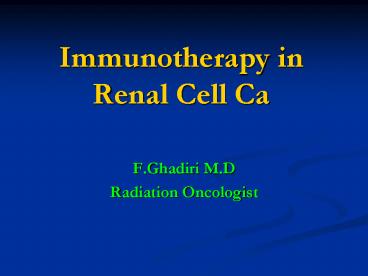Immunotherapy in Renal Cell Ca PowerPoint PPT Presentation
1 / 29
Title: Immunotherapy in Renal Cell Ca
1
Immunotherapy in Renal Cell Ca
- F.Ghadiri M.D
- Radiation Oncologist
2
Attempts to increase levels of immune lymphocytes
capable of recognizing cancer antigens and
destroying established cancers
Immunotherapy
3
Evidence for Tumor Immunity
- Spontaneous regression melanoma, lymphoma, RCC
- Regression of metastases after removal of primary
tumor pulmonary metastases from renal cell
carcinoma - Infiltration of tumors by lymphocytes and
macrophages melanoma and breast cancer - Lymphocyte proliferation in draining lymph nodes
- Higher incidence of cancer after
immunosuppression, immunodeficiency (AIDS,
neonates), aging, etc.
4
Sponateous regressions
- First observed 60 years ago
- Prospective assessment
- 7 of patients
- Median duration of 2 years
- Initial watchful waiting is appropriate
- Asymptomatic patients
- Low volume disease
- Build this into clinical trial design
5
Tumor-specific Immune Response
6
Advanced RCC Treatment
- Primary treatments are systemic therapy with
molecularly targeted therapy or immunotherapy - Surgery is palliative therapy
- Solitary metastatic site
- Solitary recurrence following nephrectomy
- Symptoms related to bulkiness of disease
including pain, nausea, or GI obstruction
7
What have we got?
- Interferon-a
- Interleukin-2
- Talactoferrin
- Sunitinib
- Sorafenib
- Pazopanib
- Bevacizumab /- Ifn-a
- Temsirolimus
- Everolimus
- Axitinib
8
(No Transcript)
9
Vaccines Yang JC Childs R J Clin Oncol 2006
245576
10
Interferon-a
- Introduced early 1980s
- Response rate 15-20
- Complete remissions are rare (1-2)
- Reduces risk of death at 1 year by one third
11
Survival with interferonMSKCC scoring system
- Risk Factors are
- No prior nephrectomy
- KPS lt80
- Low Hb
- High corrected calcium
- High LDH
12
Interleukin-2Protocols used
- High dose bolus (Rosenberg)
- High dose continuous infusion (West)
- Low dose bolus
- Subcutaneous single agent
- SC combination (with IFN 5-FU) (Atzpodien)
13
A meta-analysis of trials of Interleukin-2 in
metastatic renal cell cancerBaaten, Voogd
Wagstaff Eur J Cancer 2004 401127
Complete responses vs routeof administrationCIV
continuous infusionSCsubcutaneous
injectionBIVintermettent bolus injection
Duration of complete remissions
14
Immunotherapy
- Immunotherapy with IL-2 activates immune response
against RCC resulting in tumor remission rates
10-20 with median duration of 19-109 months - Severe toxicity including hypotension, capillary
leak syndrome, MI, renal insufficiency, pulmonary
edema, hepatic dysfunction, CNS dysfunction - Treatment requires ICU monitoring
- Used for patients that can tolerate side effects
15
Cytokine working partyJ. Clin. Oncol. 2003 Aug
15th
- HD IL-2 156 pts
- RR 21
- LD IL-2 150 pts
- RR 13 p0.04 vs HD
- SC IL-2
- RR 10 p0.033 vs HD
Survival of complete responders
16
- Predictors of response to IL-2
17
Responses to immunotherapy are observed most
frequentlyin patients with clear cell RCC21 vs
6alveolar gtgranular gtpapillary features
18
High Carbonic anhydrase IX expression has been
associated with improved survival and a higher
objective response rate in IL-2
treated patients
19
Losses ofchromosomes 4, 9, and 17p as possible
predictors of IL-2nonresponse
20
Interleukin-2
21
In contrast to the results achieved with
molecularly targeted therapies (eg, sorafenib,
sunitinib), which lead to tumor shrinkage in most
treated patients but do notproduce remissions of
cancer when therapy is discontinued, the
administration of high-dose, bolus IL-2
consistentlyhas produced durable responses in a
smallpercentage of patients with advanced RCC
22
Overview of cytokine based trials for metastatic
renal cell carcinoma
23
AVOREN TrialEscudier et al ASCO 2007 abs. nos. 3
- IFN IFN Placebo Bevacizumab
- Response Rate 13 31
- Duration of response 11 mos. 13 mos.
- Tumour shrinkage 39 70
- Progression free surv. 5.4 mos. 10.2 mos.
- Overall survival 19.8 mos. Not reached
- Grade 3/4 toxicity 45 60
- Discontinuation 12 28
24
What we know what we dont!
- Majority of IFN patients got 2nd line sunitinib
- How many patients who received sunitinib got 2nd
line cytokines what were the results?
25
There is no role for Adjuvant therapy in RCC
26
Neoadjuvant ApproachRationale
- Success of neoadjuvant therapies in other cancers
- Assurance that patients will receive systemic
treatment - Potential for more rapid determination of
response - Response as a selection tool
- Ability to analyze post-treatment tissue
27
Neoadjuvant ApproachAdvantages
- Select for surgery responding patients
- Downstaging
- Eliminates morbidity and mortality in those that
wouldn benefit anyway - Harvest of treated tissue for mechanistic studies
28
Neoadjuvant ApproachDisdvantages
- May add morbidity/mortality to surgery
- May decondition good surgial candidates
- No proven benefit
- Unclear timing of surgery
29
(No Transcript)

